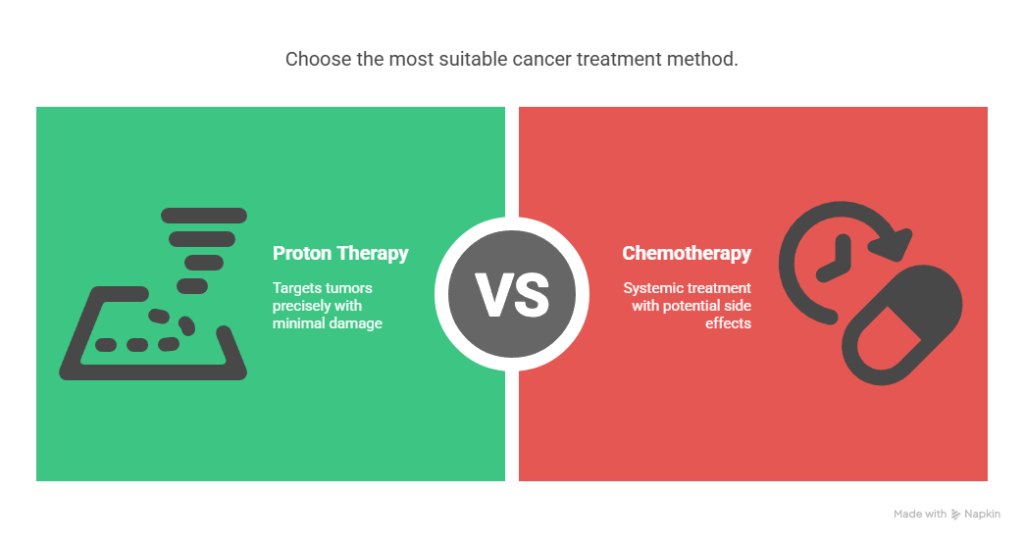Proton therapy and chemotherapy are distinct modalities used in the treatment of cancer, each with unique mechanisms and applications. Proton therapy for cancer is a type of radiation treatment that uses protons rather than X-rays to treat cancer. At the same time, chemotherapy involves the use of chemicals to destroy cancer cells. Comparing their effectiveness directly isn’t straightforward, as their uses, benefits, and side effects differ significantly based on the type and stage of cancer being treated. Facilities like those specializing in proton therapy for cancer in Hyderabad offer advanced options for patients seeking cutting-edge cancer care. Here is an in-depth look at both treatments.
Understanding Proton Therapy and Chemotherapy

Proton Therapy for Cancer:
Proton therapy for cancer is a form of radiation that targets tumors with high precision using a beam of protons. These particles are charged positively and can be controlled to stop at the tumor site, minimizing damage to the surrounding healthy tissues. This precise targeting is referred to as the Bragg peak, where most of the proton’s energy is released at a specific depth, maximizing the dose delivered to the tumor while sparing adjacent normal tissues. Because of this, proton therapy for cancer is often considered a breakthrough in radiation oncology.
Chemotherapy:
Chemotherapy involves the use of cytotoxic drugs, meaning they can kill cells or stop them from dividing. These drugs are systemic, meaning they travel throughout the body and can affect both cancerous and healthy cells, which often leads to various side effects. Chemotherapy can be used to shrink tumors, kill hidden cancer cells throughout the body, or alleviate symptoms caused by the tumor.
Comparing Effectiveness
Proton Therapy vs Chemotherapy: Type and Location of Cancer
The effectiveness of proton therapy vs chemotherapy largely depends on the type and location of the cancer. Proton therapy for cancer is especially beneficial for treating cancers located in sensitive areas where conventional radiation might cause unacceptable side effects, such as cancers in the brain, spine, or near the eyes. It’s also favored for treating pediatric cancers due to its less detrimental long-term effects on growing bodies. Additionally, it is gaining attention in cases where early detection of throat cancer symptoms prompts localized treatment that requires precision to avoid damage to surrounding vital structures.
Chemotherapy, on the other hand, is crucial for cancers that are widespread or those that have a high likelihood of metastasis since it can target cancer cells throughout the body. This includes leukemias, lymphomas, and some types of breast and lung cancer.
Proton Therapy vs Chemotherapy: Effectiveness in Treatment
Proton therapy for cancer is particularly effective in delivering higher doses of radiation directly to the tumor without causing damage to surrounding healthy tissue. This results in fewer side effects compared to traditional radiation therapy and may lead to better outcomes in certain cancers. This gives proton therapy for cancer a significant advantage in terms of quality of life post-treatment.
Chemotherapy’s effectiveness can vary widely and is influenced by the type of cancer, the stage at which it is diagnosed, and the specific drugs used. It is particularly effective for cancers that are known to respond well to chemical agents. When comparing proton therapy vs chemotherapy, it’s important to note that each has a specific role depending on whether the disease is localized or systemic.
Proton Therapy vs Chemotherapy: Side Effects
Proton therapy for cancer is associated with fewer immediate side effects compared to both traditional radiation and chemotherapy. Since proton therapy for cancer can be targeted more precisely, it reduces radiation exposure to non-cancerous tissues, potentially reducing the risk of secondary cancers and other radiation-induced damage.
Chemotherapy’s side effects are more systemic and can include nausea, fatigue, hair loss, and increased susceptibility to infections, due to its impact on normal cells, especially those that divide rapidly. Understanding proton therapy vs chemotherapy in terms of side effect profile is crucial for making informed treatment decisions.
Conclusion
Deciding whether proton therapy for cancer is more effective than chemotherapy isn’t a question of one treatment being better than the other universally; rather, it depends on specific patient circumstances, including the type, location, and stage of cancer. Proton therapy for cancer offers high precision and reduced side effects for localized tumors or cancers near critical structures, making it a preferred choice in such scenarios. However, chemotherapy remains indispensable for systemic disease control, particularly in cancers that are diffuse or have metastasized. In the debate of proton therapy vs chemotherapy, the optimal choice is always tailored to the patient’s unique medical condition and treatment goals.
For expert guidance and personalized cancer care, consult Dr. Vijay Anand Reddy, a leading oncologist known for his experience in advanced cancer treatment, including proton therapy for cancer.
Frequently Asked Questions (FAQ):
Is Proton Therapy better than Chemo?
Proton therapy is more precise and causes fewer side effects, making it ideal for localized tumors, especially near sensitive areas. Chemotherapy treats cancer throughout the body and is essential for widespread or blood cancers. One isn’t better than the other—they serve different purposes and are often used together.
What is the safest Radiation Therapy?
Proton therapy is one of the safest forms of radiation treatment. It delivers targeted radiation directly to the tumor with minimal impact on surrounding healthy tissues, reducing side effects and long-term risks. This makes it especially effective for sensitive areas like the brain, spine, and in pediatric cases.
What is the future of Proton Therapy?
The future of proton therapy is bright, with advances making it more precise, accessible, and cost-effective. Innovations like pencil beam scanning and AI-driven planning are improving outcomes, especially for complex and pediatric cancers. As technology evolves, proton therapy is set to become a key part of personalized cancer treatment.

